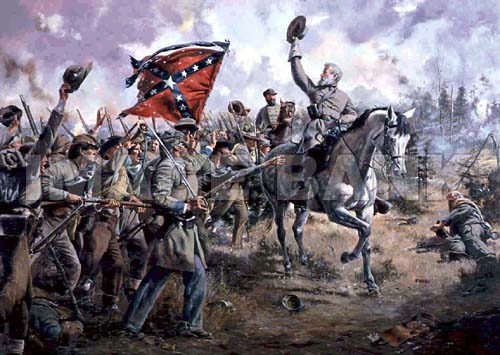by Rebecca Bynum

Victor Davis Hanson writes about Hollywood’s and the hippy movement’s romantization of the “lost cause” which remains a strong element in the American psyche. The Civil War was seen by many as the heroic resistance of the idyllic agrarian South to the souless industrial juggernaught of the North. And indeed it would be hard to imagine Robert E. Lee, who famously apologized to a Pennsylvania woman for his cavalry having trampled her flower beds, burning and deliberately starving the North as Sherman did to the South. Lee’s mistake is that he fought a 19th century war by 18th century rules encompassing chivalry. Grant and Sherman used wanton destruction and starvation to break the will of the South and they succeeded.
VDH uses “The Night They Drove Old Dixie Down” as an example in song. Here is another tribute to the southern soldier by the late, great Merle Kilgore as sung by Johnny Horton.
- Like
- Digg
- Del
- Tumblr
- VKontakte
- Buffer
- Love This
- Odnoklassniki
- Meneame
- Blogger
- Amazon
- Yahoo Mail
- Gmail
- AOL
- Newsvine
- HackerNews
- Evernote
- MySpace
- Mail.ru
- Viadeo
- Line
- Comments
- Yummly
- SMS
- Viber
- Telegram
- Subscribe
- Skype
- Facebook Messenger
- Kakao
- LiveJournal
- Yammer
- Edgar
- Fintel
- Mix
- Instapaper
- Copy Link










3 Responses
The Confederates certainly did fight bravely, but as General Grant opined, “…a foe who had fought so long and valiantly, and had suffered so much for a cause, though that cause was, I believe, one of the worst for which a people ever fought, and one for which there was the least excuse”. (From Grant’s Personal Memoirs)
Well said, Rebecca. Sadly, today’s fashionable “conservatives” have absolutely nothing positive to say about the Old South. In fact, National Review Online has been on a leftist rampage lately. One article has Jonah Goldberg mocking immigration restrictionists over Trump’s DACA stab in the back, in another Mona Charen asks whether conservatives take “rape” seriously enough (and by “rape” she seems to mean drunken sex that leads to subsequent regret), in another, Jay Nordlinger rages against the Old South. It’s nice to open something by Richard Weaver to see what conservatism used to be like.
Please see my comments on Daniel Mallock’s fine essay on history in this issue.